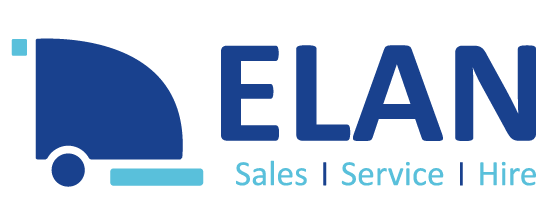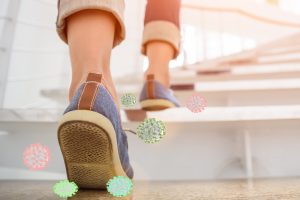Cleaning your floors may sound and feel like a low-priority whilst you prepare your work environment for the return of its employees and visitors. However, two recent studies into the role floors and shoes have played in the spread of coronavirus may change your opinion.
As you probably know, coronavirus is spread through small droplets derived from an infected person’s nose or mouth; which then land on surfaces and objects when they cough, sneeze or exhale. A non-infected person can then contract the virus, either through coming into contact with airborne particles directly, or by touching an infected surface or object, and then transferring these particles to their eyes, nose, or mouth, through touching their face.
Not all droplets are airborne
Throughout February and March, scientists tested a sample of floors and shoe soles from staff working on an Intensive Care Unit (ICU) in a Wuhan hospital, and found that half of the samples tested positive for COVID-19. Therefore, medical staff in COVID wards were unknowingly carriers of the virus. The scientific report strongly suggests that persons leaving a COVID-infected area should disinfect their shoes to limit the spread of the virus.
However, another study by the New England Journal of Medicine found that the virus can live on hard surfaces for up to 72 hours, therefore it’s not only the shoes that should be disinfected, but also floors.
Despite this newfound information, tracing and locating infected shoes and flooring will prove virtually impossible. However, as lockdown restrictions are being lifted and staff return to their places of work, these studies reemphasise the importance of upholding strict standards of cleanliness and sanitation, and that it is not only key for regular contact points, but also our floors.
Cleaning vs sanitising: What is the difference?
Cleaning a floor traditionally may not be enough to stop the spread of viruses. Traditional floor cleaners typically use a combination of water with a universal detergent, rather than a sanitiser. Cleaning a floor with a traditional cleaning detergent will remove any visible soil, debris, micro-organisms, and organic substances and can reduce the amount of contaminated matter. However, sanitisers use a combination of detergents and disinfectants that can kill viruses and bacteria to safe levels, to reduce the risk of transmission. With sanitisation, you can reduce viruses and bacteria on a surface by up to 99.99%, compared to a standard cleaning solution; which will simply remove dirt, soils and impurities from the floor surface.
With this in mind, to ensure optimal cleanliness and minimal risk of viral transmission, floors should be cleaned first, and then sanitised. It is important to note, that sanitising solutions are specifically manufactured to leave surfaces wet, to ensure they allow enough “dwell time” to dry and kill any bacteria and viruses on the affected surface. They should not be actively dried.
So, simply put, cleaning your floors with just a detergent will not be effective at neutralising any bacteria or viruses that may reside on them.
How you can sanitise your floors effectively
If you are reviewing how to ensure your premises are COVID-Secure, make sure to consider your floors. But with such a variety of floor types and range of floor cleaners available, it can be difficult to know what solution will be the most effective for your needs. Likewise, you don’t want to apply chemicals which could be ineffective or even ultimately damage your flooring.
At Elan, we have been supplying floor cleaning equipment to UK businesses for industrial & commercial environments for over 30 years, and can confidently advise you on the correct application for your floor. We have a range of models available for hire, lease or purchase to suit all requirements and budgets.
In response to client demand, we have also added a new range of sanitising & disinfection floor systems; suitable in both commercial and industrial environments.
Our new sanitising systems for TomCat Scrubber Dryers and our very own Elan-San 25 disinfectant trolley will effectively kill viruses and bacteria, in addition to removing any visible debris, to not only leave your floors appearing to be clean, but giving you, your staff and customers peace of mind that they are in-fact clean and sanitised.
TomCat have also introduced a new chemical-free solution, Zero3+, which uses ordinary tap water mixed with an antimicrobial solution to create an aqueous ozone – a powerful oxidiser, similar to chlorine, for chemical-free floor cleaning and sanitisation.
Our machines’ results speak for themselves, and we are always happy to provide a free demonstration so you can see and experience the high-quality, clean and sanitised end result for yourself.
If you would like more information on our sanitising & disinfection systems, or would like to book a free demonstration, please contact us here or give us a call on 0800 313 4336.

